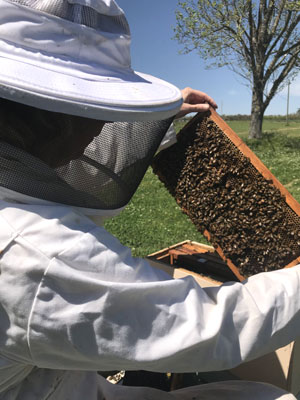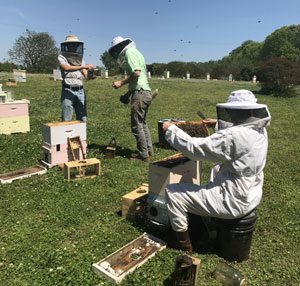
The University of Georgia creates a buzz by developing the world’s first vaccine for honeybees.
Most people regard insects as a nuisance to be swatted away. Not honeybees, however.
These pollinators are instrumental in the global production of foods that rely on insects for pollination, and, with the development of the first vaccine for the world’s honeybees, beekeepers now can protect their colonies.
The vaccine resulted from a collaboration between the University of Georgia College of Agricultural and Environmental Sciences (CAES) and Dalan Animal Health, a biotech company based at UGA’s Innovation Hub in Athens. According to Environment News Service, the U.S. Department of Agriculture has approved the vaccine for two years on a conditional basis.
The vaccine is intended to help honeybees resist American foulbrood, a destructive disease that can wipe out entire bee colonies.
“You don’t have to look far to know honeybees are having a lot of problems right now. Hives will die unless you intercede with herculean efforts,” says Keith Delaplane, professor in the CAES Department of Entomology and director of the UGA Bee Program.
 “Queen Candy”
“Queen Candy”
While traditional vaccines are injected with a syringe, the honeybee vaccine is mixed into the queen feed that is consumed by worker bees and then fed to the queen.
After she ingests it, the inoculated queen, for the remainder of her lifetime, will produce worker bees that are primed to be immune to foulbrood as they hatch.
“This work is so new,” says Annette Kleiser, co-founder and CEO of Dalan. “There are no guidelines, no handbook. We are developing, together with Keith, what will be the gold standard for these trials. It’s really exciting; it is the first of its kind.”
Pollinators such as bees are responsible for one of every three bites of food humans eat, according to the USDA, and U.S. crops that depend on honeybee pollination are valued at more than $15 billion.
However, pollinator numbers have been declining for years. According to a survey by the Bee Informed Partnership, U.S. beekeepers lost 39 percent of their honeybees from April 2021 through April 2022.
“People don’t understand how hard it is to keep bees alive,” says Delaplane. “I can’t imagine a more frightening branch of agriculture to be in. It takes ceaseless attention.”
The animal vaccine can be used in organic agriculture, and it will be available on a limited basis to commercial beekeepers this year.
Who You Gonna Call?
If a swarm of honeybees takes up residence in your house, it’s now safer to tell them to buzz off. A new Honeybee Control and Removal state certification program requires pest control companies and operators who provide the service in Georgia to be certified and licensed.
The new law prohibits the use of pesticides in honeybee removal, so it’s better for your home and the bees.



